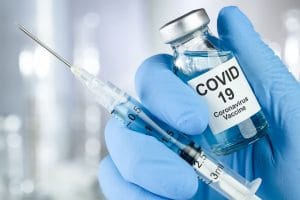My Employer Required the COVID-19 Vaccine and I Was Injured. What Do I Do?
 You trust that your employer is supposed to protect your wellbeing but sometimes even the best intentions can leave you injured and needing help. That’s where the experienced Delaware workers’ compensation attorneys at Silverman, McDonald & Friedman come in. With offices located in Newark, Wilmington, and Seaford, we will be there to make things right for you.
You trust that your employer is supposed to protect your wellbeing but sometimes even the best intentions can leave you injured and needing help. That’s where the experienced Delaware workers’ compensation attorneys at Silverman, McDonald & Friedman come in. With offices located in Newark, Wilmington, and Seaford, we will be there to make things right for you.
Now that COVID-19 vaccines are being made available, employers around the country are considering whether to mandate vaccinations. If your employer requires you to take the vaccine as a condition of maintaining your employment, and you sustain injuries or have a severe allergic reaction, you may be able to claim workers’ compensation benefits while you recover.
Employers may have vaccine liability
By requiring employees be vaccinated against Covid-19, whether or not they fall into untested high-risk groups, employers may face workers’ compensation claims for adverse reactions. Once they make it company policy it essentially becomes part of an employee’s job. Since work-related injuries are covered events, it is likely that most states would permit the filing of a claim.
Where this can become a gray area is when the vaccine is not required, but instead is strongly recommended. At that point, even if the employee feels pressured to get inoculated, the ultimate decision is his/hers. It all boils down to the specific wording and how it can be interpreted.
For now, it may be a work injury claim that you can make, but only time will tell if the government will offer more protection to employers by providing immunity under the Public Readiness and Emergency Preparedness Act.
Making a claim through the Countermeasures Injury Compensation Program
In the event that workers’ compensation is not available, or if you have a severe reaction, you can also put in a claim through the Countermeasures Injury Compensation Program (CICP). This federal program allows you to claim benefits if you suffer injury from “a vaccination, medication, device, or other item recommended to diagnose, prevent or treat a declared pandemic, epidemic or security threat.” Seeking benefits through the CICP can be a challenge, however, so it is better to see if there are other, more immediate options available to you.
Rare does not mean impossible: risks associated with vaccine allergies
The fact that there have been a low number of adverse reactions to the vaccine is a great accomplishment given the urgency to get it to market. However, that means there is still a risk you are being required to take just by your employer deciding to mandate a company vaccination policy. The primary damaging side effect that some vaccinated workers have suffered is anaphylaxis – a potentially deadly allergic reaction.
Some other serious health issues that have been reported include:
- Bell’s palsy
- Appendicitis
- Acute myocardial infarction, also known as a heart attack
- Cerebrovascular accidents, commonly referred to as strokes
- Shoulder injury
- Adenopathy, which is a change in the size and consistency of the lymph nodes in the armpit
A lack of vaccine data can create more risk
One of the problems with employers forcing employees to take the vaccine is that is has not been tested on every group of people. For example, pregnant women were not part of the clinical trial and therefore there is no information on whether there could be adverse effects on expectant mothers or fetuses.
Other groups that lack data that could show the risk of vaccine side effects include:
- The elderly where over half of all COVID-19 clinical trials and vaccine trials excluded people over 65.
- The immunocompromised were excluded from trials by both Pfizer and Moderna.
- People with autoimmune diseases were not studied, but they were eligible for enrollment in the trial.
If you are hurt on the job because you complied with a company policy, do not entrust recovering from your injuries to the very people who caused them. The seasoned Delaware workers’ compensation attorneys at Silverman, McDonald & Friedman understand the claims process and will make sure that you are treated fairly. To schedule your free case evaluation in our Wilmington, Seaford, or Newark office, call 302-888-2900, or we invite you to reach out to us through our contact page to tell us your story.
Attorney Jeffrey S. Friedman joined Silverman, McDonald & Friedman in 2001. He graduated from Widener University School of Law, and is admitted to practice law in Delaware and Pennsylvania, and in several Federal Circuit courts. He areas of concentration include auto accident and workers’ compensation cases. Read more about Attorney Friedman here.

